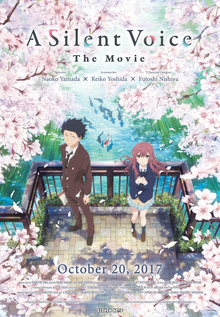
So Your Name was obviously the big anime hit of 2016 that everyone went to see. This lesser known film was number two in Japan. It did make the news in Malaysia in 2017 when a large cinema screen was forced to pull screenings of it due to the studio’s complaints about rampant piracy in our country. I think that was about when I added it to my watch list as well.
The film begins with a scene of high-school student Shoya Ishida putting his affairs into order and then walking onto a bridge to commit suicide. He loses his nerve at the last minute however as flashbacks reveal the circumstances that led to his present despair. In elementary school Shoya was a mischievous student with many friends. One day a new student Shoko Nishimiya joins the class and upsets the existing social dynamic. As she is deaf, the other students must make special allowances for her behavior and Shoya takes it upon himself to bully and harass her. Instead of fighting back, Shoko keeps apologizing which infuriates him even more. After several sets of Shoko’s hearing aids are damaged or lost, the teacher is forced to intervene and singles out Shoya. Angry, he points out the other students who encouraged or helped him. Shoko transfers out but Shoya is ostracized by the other students and loses all of his friends. The situation persists until high-school, causing him to be depressed and to develop a fear of facing others head-on.
Our first impression of the film was not good as it seemed like yet another case of setting up a bad boy to be reformed by a good girl, made even more infuriating here by the girl’s passivity and how she seems to be attracted to the boy despite how viciously he bullies her. I’m happy to report that it gets better and has a lot more depth than we initially gave it credit for. In fact, I’d go so far as to say that it’s one of the rare anime films which are definitely aimed only at adults. Though the premise makes it seem like it’s about a disabled girl and her travails, it’s really making a wider point about the phenomenon of bullying, the pressure to conform in Japanese society and even about how this leads to elevated numbers of suicides in that country. I suspect that there may be even more going on here but a cultural barrier prevents us from fully appreciating the full extent of the social complexities involved.
One of the most interesting things about this film is that it highlights the tension between the Japanese drive for social conformity and the fact that bullying is usually considered to be wrong. It’s frustrating to see Shoko continually apologize and not get angry at her tormentors as if she were some kind of saint. It makes more sense when you understand that Shoko is disrupting the other students simply be being present. Her inability to hear makes her unable to participate in the polite rituals of everyday life and both students and teachers must go out of their way to accommodate her. In that sense, bullying is a mechanism meant to force dissenters to either conform or to leave and Shoya is therefore only acting on behalf of the silent majority. Of course, everyone recognizes that it’s not that Shoko won’t conform, it’s that she simply can’t and that bullying her is cruel. But the Japanese instinct to blend in is strong and arguably that’s why the teachers in this film don’t step in until Shoko’s mother files an official complaint even though they can see what is happening. It certainly makes for a very convincing case study of why bullying happens in Japanese schools.
I think it’s noteworthy that both the director Naoko Yamada and the writer Reiko Yoshida for this film are women. A Silent Voice, while still being distinctly Japanese, departs from anime norms in being both extraordinarily sensitive to subtleties of Japanese society and by refusing to hit the usual tropes. I am very glad for example that the film isn’t really about the two main characters being romantically entangled. I do think that there are some pacing issues and the film is a little too long. The subplot concerning Shoko’s younger sibling and their grandmother feels out of place for example and seems to have been included just to give credence to the predictive power of dreams. It would also have been great if it were a little more bold, such as by having Shoya being romantically involved with Naoko Ueno, the girl who most often joins him in bullying Shoko.
I wouldn’t call this great or a favorite of mine because there are aspects of it that I can’t relate to. But watching so many Japanese anime that espouse what is essentially an adolescent mentality and that more or less feel similar to one another, it’s very refreshing to come across one that feels very different and can’t simply be dismissed as a children’s cartoon.
One thought on “A Silent Voice (2016)”